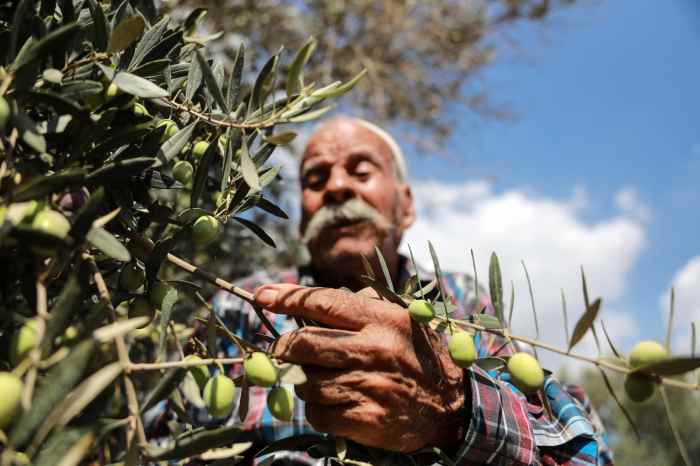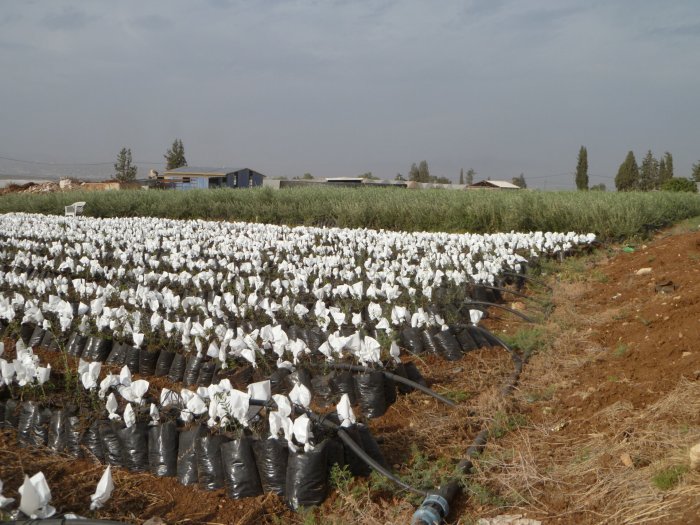Modern Olive Farming Techniques in Palestine

Plant olive trees in palestine – Palestinian olive farming, a cornerstone of the nation’s agricultural heritage and economy, is undergoing a transformation driven by technological advancements and a growing emphasis on sustainability. Modern techniques are improving yields, quality, and resilience, ensuring the continued prosperity of this vital sector. This section details key aspects of modern olive cultivation practices in Palestine.
Planting Olive Trees in Palestinian Conditions
Successful olive tree planting in Palestine requires careful consideration of the local climate and soil conditions. A step-by-step guide ensures optimal establishment and growth. First, select high-quality olive saplings from reputable nurseries, ensuring disease-free stock adapted to the region’s specific climate and soil type. Next, prepare the planting site by thoroughly tilling the soil to improve drainage and aeration.
Planting pits should be dug sufficiently large to accommodate the root system without causing root damage. The sapling should be planted at the same depth it was growing in the nursery. After planting, water generously to settle the soil around the roots. Regular watering is crucial during the establishment phase, particularly during dry periods. Finally, consider using windbreaks to protect young trees from strong winds, common in certain Palestinian regions.
Planting olive trees in Palestine is a deeply rooted tradition, vital for both the economy and cultural heritage. The resilience of these trees mirrors the tenacity of the people. Interestingly, the cultivation techniques could draw parallels with caring for other hardy plants, such as the tea tree live plant , which also requires specific soil and climate conditions.
Ultimately, the success of olive tree cultivation in Palestine highlights the importance of understanding the needs of each plant to achieve sustainable growth.
Proper spacing between trees is essential for optimal growth and sunlight penetration.
Olive Tree Pruning, Fertilization, and Pest Control, Plant olive trees in palestine
Effective pruning, fertilization, and pest control are vital for maximizing olive tree productivity and health. Pruning techniques should aim to maintain an open canopy structure, improving air circulation and sunlight penetration, reducing the incidence of fungal diseases. This typically involves removing dead, damaged, or crossing branches. Fertilization should be tailored to soil conditions and the tree’s nutritional needs.
Soil testing can determine deficiencies and guide the application of appropriate fertilizers, ensuring balanced nutrient uptake. Regular monitoring for pests and diseases is essential for timely intervention. Integrated pest management (IPM) strategies, emphasizing preventative measures and minimizing chemical pesticide use, are increasingly adopted to protect beneficial insects and maintain environmental balance. Common pests include olive fly and scale insects, while fungal diseases like peacock spot can significantly impact yield.
Organic pest control methods, such as introducing beneficial insects or using natural pesticides, are gaining popularity.
Olive Tree Varieties Suitable for Palestine
Choosing the right olive variety is crucial for optimal yield and quality in Palestinian conditions. Different varieties exhibit varying levels of drought tolerance, disease resistance, and oil content. The following table compares some suitable varieties:
| Variety | Characteristics | Oil Content | Disease Resistance |
|---|---|---|---|
| Baladi | High oil content, drought-tolerant, traditional Palestinian variety | High | Moderate |
| Nabali | High yield, good oil quality, widely adapted | Medium-High | Good |
| Sourri | Late ripening, high oil quality, good for table olives | Medium | Moderate |
| Manzanilla | Suitable for table olives, medium oil content | Medium | Good |
Benefits of Organic Farming Methods in Palestinian Olive Groves
Organic olive farming offers several advantages, aligning with growing consumer demand for sustainable and environmentally friendly products. By avoiding synthetic pesticides and fertilizers, organic methods protect biodiversity, reduce water pollution, and enhance soil health. This leads to healthier trees, improved fruit quality, and a more sustainable agricultural system. Moreover, organic olive oil often commands higher market prices, increasing the economic viability of this approach.
The reduced environmental impact is also a significant benefit, particularly in regions facing water scarcity and soil degradation. Organic farming practices often incorporate traditional knowledge with modern techniques, promoting a resilient and sustainable agricultural model for future generations.
Socioeconomic Impact of Olive Cultivation in Palestine

Olive cultivation plays a vital role in the Palestinian economy, extending far beyond mere agricultural production. It represents a significant source of income for numerous families, contributes to food security, and is deeply intertwined with Palestinian cultural identity and heritage. The sector’s economic impact is multifaceted, encompassing employment, export earnings, and the preservation of traditional practices.Olive oil production is a cornerstone of Palestinian livelihoods.
For many rural families, particularly in the West Bank and Gaza Strip, olive farming provides a primary source of income and sustenance. The harvest season is a communal event, involving entire families and communities in the process of picking, pressing, and selling the olives and oil. This activity not only generates income but also strengthens social bonds and preserves traditional knowledge passed down through generations.
Challenges Faced by Palestinian Olive Farmers
Palestinian olive farmers confront numerous obstacles that hinder their ability to fully realize the economic potential of their crops. Access to land is a major constraint, particularly given the ongoing Israeli occupation and the restrictions it imposes on Palestinian movement and land ownership. Confiscation of land, the construction of the separation barrier, and the limitations on access to water resources all severely impact olive production.
Furthermore, Palestinian farmers often face difficulties accessing fair and competitive markets, both domestically and internationally. This is exacerbated by limited infrastructure, trade barriers, and the dominance of larger, international players in the olive oil market. The lack of access to modern technologies and efficient processing facilities also contributes to lower yields and reduced profitability.
A Case Study: The Success of a Palestinian Olive Oil Cooperative
The Al-Ard cooperative in the West Bank serves as a compelling example of how collective action can empower Palestinian olive farmers. Established by a group of women farmers, Al-Ard focuses on producing high-quality extra virgin olive oil using traditional and sustainable methods. Through collective marketing and branding, the cooperative has secured access to both domestic and international markets, achieving premium prices for its product.
The cooperative’s success is attributed to its strong organizational structure, its commitment to quality control, and its effective marketing strategies. By working together, the women farmers have not only increased their income but also empowered themselves economically and socially. The cooperative provides a model for other Palestinian farmers seeking to overcome market access challenges and improve their livelihoods through collaborative efforts.
Their success highlights the potential of cooperatives to address some of the key challenges faced by Palestinian olive farmers and to promote sustainable and equitable development within the sector.
FAQ Summary: Plant Olive Trees In Palestine
What are the most common olive varieties grown in Palestine?
Several varieties thrive in Palestine, including Nabali, Baladi, and Soury, each with unique characteristics impacting oil quality and yield.
What diseases and pests commonly affect olive trees in Palestine?
Common threats include olive knot, olive fly, and various fungal diseases. Proper pruning, sanitation, and integrated pest management are crucial.
How is Palestinian olive oil marketed internationally?
Marketing focuses on highlighting the unique quality, taste, and historical significance of Palestinian olive oil, often emphasizing organic and fair-trade practices.
What are the long-term prospects for olive cultivation in Palestine?
The future hinges on addressing water scarcity, improving infrastructure, and enhancing market access. Sustainable practices are key to long-term viability.
